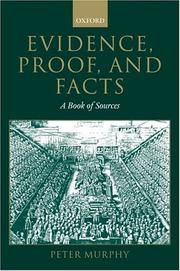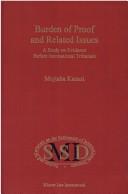| Listing 1 - 10 of 51 | << page >> |
Sort by
|

ISBN: 0199261954 Year: 2003 Publisher: Oxford Oxford University Press
Abstract | Keywords | Export | Availability | Bookmark
 Loading...
Loading...Choose an application
- Reference Manager
- EndNote
- RefWorks (Direct export to RefWorks)
Burden of proof. --- Evidence (Law) --- Probabilities. --- Philosophy.
Book
ISBN: 0817392262 9780817392260 9780817320171 0817320172 Year: 2019 Publisher: Tuscaloosa
Abstract | Keywords | Export | Availability | Bookmark
 Loading...
Loading...Choose an application
- Reference Manager
- EndNote
- RefWorks (Direct export to RefWorks)
Book
ISBN: 1472565134 1282919679 9786612919671 1847315879 9781847315878 9781282919679 6612919671 9781472565136 9781849460361 1849460361 Year: 2010 Publisher: Portland Hart
Abstract | Keywords | Export | Availability | Bookmark
 Loading...
Loading...Choose an application
- Reference Manager
- EndNote
- RefWorks (Direct export to RefWorks)
The presumption of innocence is universally recognized as a fundamental human right and a core principle in the administration of criminal justice. Nonetheless, statutes creating criminal offences regularly depart from the presumption of innocence by requiring defendants to prove specific matters in order to avoid conviction. Legislatures and courts seek to justify this departure by asserting that the reversal of the burden of proof is necessary to meet the community interest in prosecuting serious crime and maintaining workable criminal sanctions. This book investigates the supposed justifications for limitation of the presumption of innocence. It does so through a comprehensive analysis of the history, rationale and scope of the presumption of innocence. It is argued that the values underlying the presumption of innocence are of such fundamental importance to individual liberty that they cannot be sacrificed on the altar of community interest. In particular, it is argued that a test of 'proportionality', which seeks to weigh individual rights against the community interest, is inappropriate in the context of the presumption of innocence and that courts ought instead to focus on whether an impugned measure threatens the values which the presumption is designed to protect. The book undertakes a complete and systematic review of the United Kingdom and Strasbourg authority on the presumption of innocence. It also draws upon extensive references to comparative material, both judicial and academic, from the United States, Canada and South Africa
Presumption of innocence. --- Presumption of innocence --- Burden of proof. --- Human rights. --- Comparative law. --- Burden of proof --- Human rights
Book
ISBN: 9780748681921 0748681922 9780748641277 0748641270 9780748641277 0748684409 Year: 2013 Publisher: Edinburgh Edinburgh University Press
Abstract | Keywords | Export | Availability | Bookmark
 Loading...
Loading...Choose an application
- Reference Manager
- EndNote
- RefWorks (Direct export to RefWorks)
Described by Henry James as a 'dark, silent, medieval woman', Jane Burden Morris has tended to remain a rather one-dimensional figure in subsequent accounts. This book, however, challenges the stereotype of Jane Morris as silent model, reclusive invalid, and unfaithful wife. Drawing on extensive archival research as well as the biographical and literary tradition surrounding William Morris and Dante Gabriel Rossetti, the book argues that Jane Morris is a figure who complicates current understandings of Victorian female subjectivity because she does not fit neatly into Victorian categories of feminine identity. She was a working-class woman who married into middle-class affluence, an artist's model who became an accomplished embroiderer and designer, and an apparently reclusive, silent invalid who was the lover of Dante Gabriel Rossetti and Wilfred Scawen Blunt.
Artists' models --- Models, Artists' --- Models (Persons) --- Morris, Jane, --- Burden, Jane, --- Morris, Jane Burden, --- Women --- Civilization, Modern --- History --- Great Britain --- Civilization --- Nineteenth century
Book
ISBN: 1421422816 9781421422817 9781421422794 1421422794 9781421422800 1421422808 Year: 2017 Publisher: Baltimore
Abstract | Keywords | Export | Availability | Bookmark
 Loading...
Loading...Choose an application
- Reference Manager
- EndNote
- RefWorks (Direct export to RefWorks)
The third and longest part addresses the vulnerability of diverse groups to depressive illness and underscore best practices to mitigate risk while improving both the preventive and therapeutic armamentaria.
Cost of Illness --- Public Health Practice --- Depressive Disorder --- Dejection --- Depression, Unipolar --- Depressive disorder --- Depressive psychoses --- Melancholia --- Mental depression --- Unipolar depression --- Affective disorders --- Neurasthenia --- Neuroses --- Manic-depressive illness --- Melancholy --- Sadness --- therapy --- prevention & control --- Health Practice, Public --- Health Practices, Public --- Practice, Public Health --- Practices, Public Health --- Public Health Practices --- Cost of Disease --- Cost of Sickness --- Costs of Disease --- Disease Cost --- Economic Burden of Disease --- Sickness Cost --- Burden Of Disease --- Burden of Illness --- Disease Burden --- Disease Costs --- Burden Of Diseases --- Burden, Disease --- Cost, Disease --- Disease Burdens --- Illness Burden --- Illness Burdens --- Illness Cost --- Illness Costs --- Sickness Costs

ISBN: 904110142X 9789041101426 Year: 1996 Volume: 1 Publisher: The Hague ; Boston : Kluwer Law International,
Abstract | Keywords | Export | Availability | Bookmark
 Loading...
Loading...Choose an application
- Reference Manager
- EndNote
- RefWorks (Direct export to RefWorks)
Bewijs (Recht) --- Bewijslast --- Bewijsleer --- Bewijsrecht --- Burden of proof --- Charge de la preuve --- Courts [International ] --- Evidence (Law) --- Extrinsic evidence --- Fardeau de la preuve --- Gerechtshoven [Internationale ] --- International courts --- Internationale rechtbanken --- Onus probandi --- Parol evidence --- Preuve (Droit) --- Proof [Burden of ] --- Rechtbanken [Internationale ] --- Trial evidence --- Tribunals [International ] --- Tribunaux internationaux --- International courts. --- Burden of proof. --- Evidence (Law).
Book
ISBN: 1316540324 1316540758 1316541185 1316541614 1316543331 1316415775 1107124182 1107570484 1316537749 9781316415771 9781316543337 9781107124189 9781107570481 9781107124189 9781107570481 Year: 2016 Publisher: Cambridge
Abstract | Keywords | Export | Availability | Bookmark
 Loading...
Loading...Choose an application
- Reference Manager
- EndNote
- RefWorks (Direct export to RefWorks)
Adjudicative tribunals in both criminal and non-criminal cases rely on the concept of the 'burden of proof' to resolve uncertainty about facts. Perhaps surprisingly, this concept remains clouded and deeply controversial. Written by an internationally renowned scholar, this book explores contemporary thinking on the evidential requirements that are critical for all practical decision-making, including adjudication. Although the idea that evidence must favor one side over the other to a specified degree, such as 'beyond reasonable doubt', is familiar, less well-understood is an idea associated with the work of John Maynard Keynes, namely that there are requirements on the total amount of evidence considered to decide the case. The author expertly explores this distinct Keynesian concept and its implications. Hypothetical examples and litigated cases are included to assist understanding of the ideas developed. Implications include an expanded conception of the burden of producing evidence and how it should be administered.
Burden of proof. --- Evidence. --- Proof theory. --- Logic, Symbolic and mathematical --- Proof --- Belief and doubt --- Faith --- Logic --- Philosophy --- Truth --- Burden of proof --- Onus probandi --- Proof, Burden of --- Evidence (Law) --- Trial practice --- Presumption of innocence --- Law and legislation --- Keynes, John Maynard, --- Keynes, J. Maynard --- Keynes, J.M.
Book
ISBN: 1921666366 1921666374 9781921666377 9781921666366 9781921666360 Year: 2010 Publisher: Canberra, A.C.T. : ANU E Press,
Abstract | Keywords | Export | Availability | Bookmark
 Loading...
Loading...Choose an application
- Reference Manager
- EndNote
- RefWorks (Direct export to RefWorks)
Burden of proof - Australia. --- Criminal justice, Administration of --- Evidence, Criminal --- Burden of proof --- Criminal investigation --- Criminal law --- Social Welfare & Social Work --- Social Sciences --- Criminology, Penology & Juvenile Delinquency --- Crime detection --- Crime investigation --- Criminal investigations --- Onus probandi --- Proof, Burden of --- Criminal evidence --- Law and legislation --- Investigations --- Law enforcement --- Crime scenes --- Detectives --- Forensic sciences --- Evidence (Law) --- Trial practice --- Presumption of innocence --- Criminal procedure --- Reasonable doubt --- Detection of crime --- Suspects (Criminal investigation) --- Informers
Book
ISBN: 1475599811 9781475599817 1475599730 9781475599732 1475599773 Year: 2017 Publisher: Washington, D.C. : International Monetary Fund,
Abstract | Keywords | Export | Availability | Bookmark
 Loading...
Loading...Choose an application
- Reference Manager
- EndNote
- RefWorks (Direct export to RefWorks)
This paper estimates the determinants of external debt distress in low-income countries (LICs), disentangling the roles of institutions, shocks, and policies. The most prominent factors in raising the risk of debt distress are the weak protection of private property rights, adverse shocks to real non-oil commodity prices, and a high debt burden. Results also suggest that weak economic institutions tend to raise the probability of debt distress through persistently weak economic policies and high vulnerability to external shocks. The model enables a more granular analysis of debt sustainability in LICs and has a higher predictive power compared to the earlier scant literature.
Exports and Imports --- International Lending and Debt Problems --- International economics --- Debt sustainability --- External debt --- Debt burden --- Debt default --- Public and publicly-guaranteed external debt --- Debts, External --- United States
Book
ISBN: 2807210821 9782807210820 Year: 2023 Publisher: Liège : Anthemis,
Abstract | Keywords | Export | Availability | Bookmark
 Loading...
Loading...Choose an application
- Reference Manager
- EndNote
- RefWorks (Direct export to RefWorks)
La preuve sous différents aspects : en droit civil, social, économique et pénal. Le droit de la preuve civile a été modifié par le livre 8 du Code civil. Trois ans après son entrée en vigueur, il a paru opportun de faire le point sur l'évolution de la jurisprudence, parfois inattendue. Mais la preuve est une matière transversale et ne se réduit pas à la preuve civile. C'est donc l'occasion de revoir la preuve sous différents aspects : en droit social, économique et pénal. Si certaines matières font l'objet d'examens réguliers (la preuve en droit social notamment), d'autres sont moins étudiées (la preuve en droit économique). Enfin, la preuve en droit pénal fait figure d'électron libre dans cette énumération, vu ses grandes spécificités par rapport à la preuve civile. Les praticiens pourront donc trouver dans cet ouvrage des éléments relatifs à la preuve dans chacune de leurs spécialités.
Preuve (droit) --- Réforme --- Belgique --- Evidence (Law) --- Preuve (Droit) --- Burden of proof --- Fardeau de la preuve --- Law and legislation --- Droit --- droit économique.
| Listing 1 - 10 of 51 | << page >> |
Sort by
|

 Search
Search Feedback
Feedback About UniCat
About UniCat  Help
Help News
News